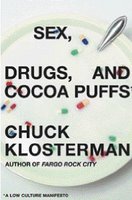
Chuck Klosterman, Sex, Drugs, and Cocoa Puffs
Pop culture is a tricky fence to straddle. On the one side you have the "critics," who diminish the importance of pop culture analysis, deeming it an exercise in futility because little worthwhile can come from that which, by its nature, is ephemeral (not to mention "popular"). On the other side you have the analysts themselves, seeking to make sense of (and give relevance to) the slippery miscellania of our Existence.
Enter Klosterman, who straddles that fence nicely in this collection of essays (each of which is separated by an informal blog-like "rant" or observation that offers something of a segue from one essay to the next). Whether he's examining the social significance of The Real World, the influence of internet porn on cultural definitions of beauty, the amorous conquests of The Fonz, the importance of Clint Black lyrics, or why Luke Skywalker is the first cinematic representation of that which would years later become known as Generation X, Klosterman draws from a wide range of topics -- sports, art, film, TV, politics, religion, etc. -- and provides compelling links among all of these to demonstrate that "[i]n and of itself, nothing really matters. What matters is that nothing is ever 'in and of itself'."
This book isn't for everyone, of course. My guess is that those of us born between, say, 1960 and 1982 (roughly the Gen X'ers or, as my friend Dave calls us, the Electric Company generation) will get the most amusement from Klosterman's observations. Folks who are either older or younger than this will simply not care about his swipes at Billy Joel's Glass Houses or his HBO reveries. Perhaps that's the biggest problem with pop culture analysis: it often fails to engage those who are not part and parcel of that particular "moment" in pop culture. But Klosterman makes valient attempts to bridge that gap, as when he writes the following:
Here is the easiest way to explain the genius of Johnny Cash: Singing from the perspective of a convicted murderer in the song "Folsom Prison Blues," Cash is struck by pangs of regret when he sits in his cell and hears a distant train whistle. This is because people on that train are "probably drinkin' coffee." And this is also why Cash seems completely credible as a felon: He doesn't want freedom or friendship or Jesus or a new lawyer. He wants coffee.
Within the mind of a killer, complex feelings are eerily simple.
This is why killers can shoot men in Reno just to watch them die, and the rest of us usually can't.
This is a humorous and insightful collection.
No comments:
Post a Comment